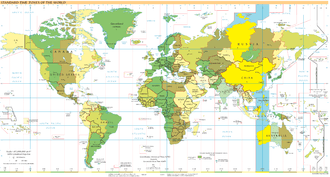Philippine Standard Time


Philippine Standard Time (Filipino: Pamantayang Oras ng Pilipinas, abbreviated PhST), and informally Juan Time, is the official name for the time in the Philippines. The country only uses one time zone (UTC+08:00), and for a short period also used daylight saving time as an emergency measure.
Geographic details
Geographically, the Philippines lies within 116°40′ and 126°34′ east of the Prime Meridian, and is physically located within the UTC+08:00 time zone. Philippine Standard Time is maintained by the Philippine Atmospheric, Geophysical and Astronomical Services Administration (PAGASA). The Philippines shares the same time zone with Hong Kong, Macau, Singapore, most parts of China, Taiwan, Malaysia, Brunei, central Indonesia, and Western Australia.
History
Philippine Standard Time was instituted through Batas Pambansa Blg. 8 (that defined the metric system), approved on 2 December 1978 and implemented on 1 January 1983. The Philippines is one of the few countries to officially and almost exclusively use the 12-hour clock in non-military situations.
Use of daylight saving time
Due to frequent rolling blackouts, daylight saving time was instituted in the 1990s. As national power supplies and transmission systems recovered, daylight saving time was abolished.[1][2]
Juan Time
Television and radio stations in the Philippines display the time, but varied from a few seconds to minutes. In September 2011, the Department of Science and Technology proposed to synchronise time nationwide in an effort to discourage tardiness. PAGASA installed a rubidium atomic clock, a GPS receiver, a time interval counter, distribution amplifier and a computer to help calculate the time difference with every satellite within its antenna’s field of view.[3]
On May 15, 2013, President Benigno Aquino III signed Republic Act No. 10535, better known as the "Philippine Standard Time Act of 2013" as a last step to finally implement the Juan Time. Effective June 1, 2013, all government offices and media networks will be required to use Philippine Standard Time as a basis to set their timepieces.[4][5]
IANA time zone database
The IANA time zone database contains one zone for the Philippines in the file zone.tab, named Asia/Manila.
Date and Time Format
Date
- Standard: mmmm dd, yyyy
- Formal (Public Documents): ddth day of mmmm, yyyy
- Filipino: ika-dd ng mmmm, yyyy
- Passport: dd mm yy
Time
- Standard: 12-hour clock
- Military/ Boy Scout: US Military Time
- Public Transport and Marathon events: 24-hour clock
- Common Spoken Language
- Spanish derived (AM radio stations and common areas)
- 8:41 - Alas Ocho Cuarenta y Uno
- 5:30 - Alas Cinco y Medya
- 3:00 - Alas Tres
- English derived (Business, Legal and others)
- 8:41 PM - Eight Forty One PM
- 5:30 AM - Five Thirty AM
- 3:00 PM - Three O'Clock or Three PM
- 12:00 PM - Twelve Noon - it is seldom to use Twelve PM as it might confuse with 12 Midnight to common Filipinos
- 12:00 AM - Twelve Midnight - it is seldom to use Twelve AM as it might confuse with daylight to common Filipinos
- Filipino
- Starts with Spanish and ends with Filipino, Umaga starts at 5:00 AM and ends 11:59 AM. Tanghali is noon. Hapon starts at 1:00 PM and ends 5:59 PM. Gabi starts at 6:00 PM and ends 11:59 PM. Madaling Araw starts at 12:00 AM and ends 4:59 AM. Filipinos very rare use numbers in local language in verbatim in telling time.
- 8:41 PM - Alas Ocho Cuarenta y Uno ng Gabi
- 5:30 AM - Alas Cinco y Medya ng Umaga
- 3:00 PM - Alas Tres ng Hapon
- 12:00 PM - Alas Dose ng Tanghali
- 12:00 AM - Alas Dose ng Madaling Araw
- 2:00 AM - Alas Dos ng Madaling Araw
- Spanish derived (AM radio stations and common areas)
References
- ↑ Manila Standard Today | Latest News in the Philippines
- ↑ http://money.inq7.net/topstories/view_topstories.php?yyyy=2006&mon=04&dd=26&file=11
- ↑ Juan Time: Filipino time redefined | ABS-CBN News
- ↑ PHL Standard Time to counter 'Filipino time' starting June 1 | SciTech | GMA News Online
- ↑ Are you on Philippine Standard Time? | ABS-CBN News
External links
- Official time of the Philippines according to the Philippine Standard Time
- http://www.worldtimezone.com/wtz-names/wtz-pht.html
- http://www.timeanddate.com/worldclock/timezone.html?n=145
- http://cpan.uwinnipeg.ca/htdocs/DateTime-TimeZone/DateTime/TimeZone/Asia/Manila.pm.html
| |||||||||||